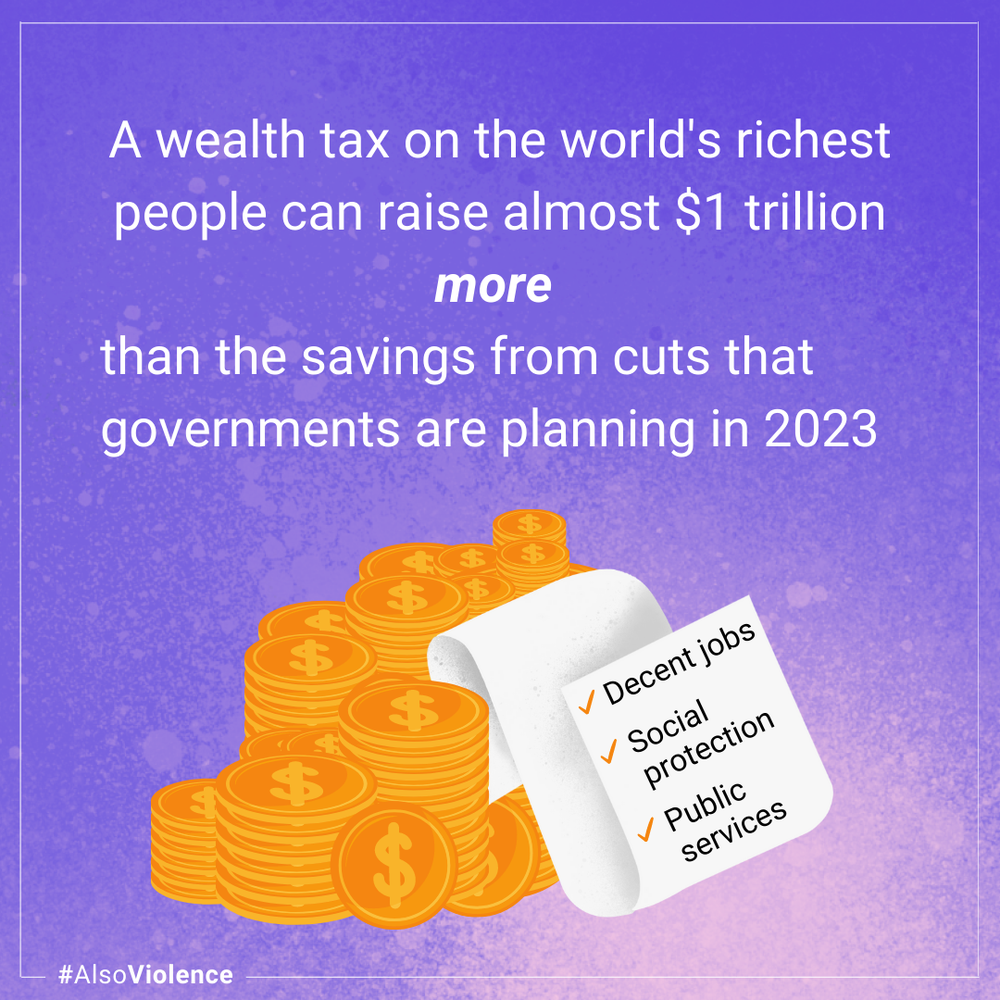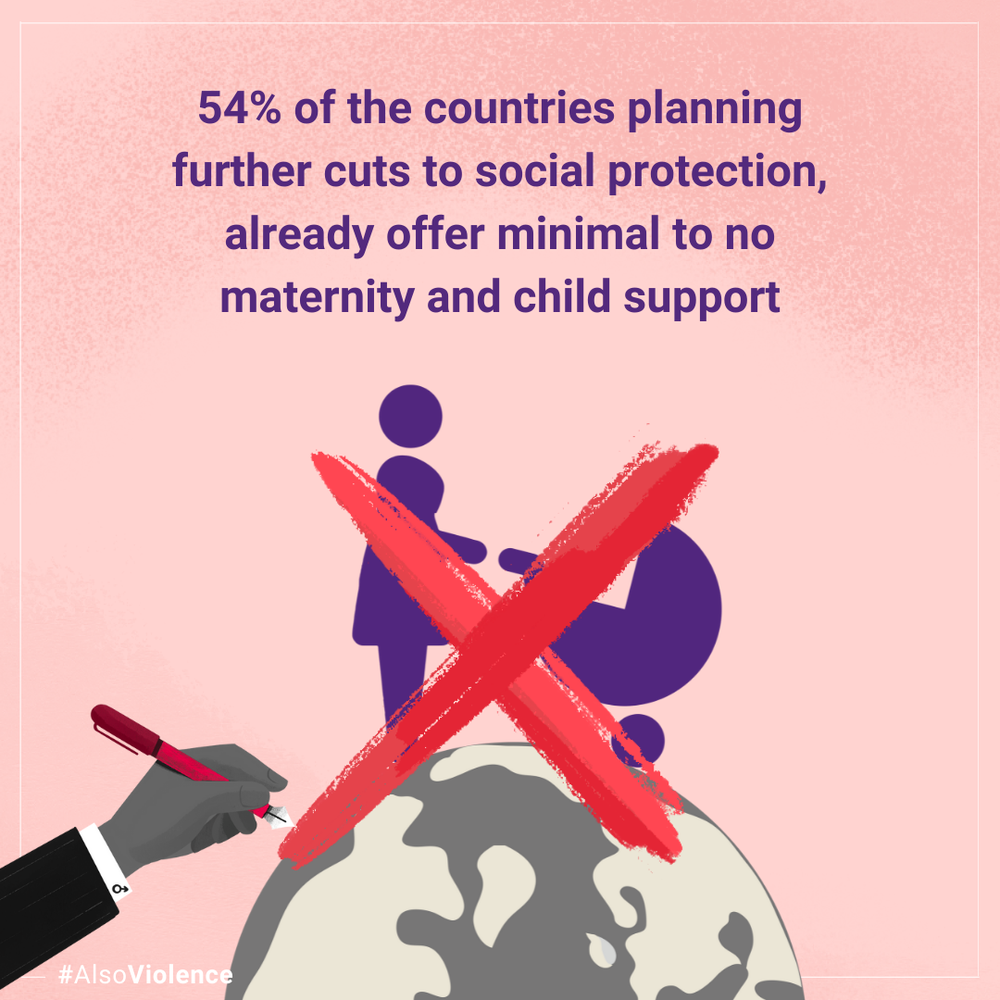Governments' economic policies are a form of gender-based violence
Governments responding to the cost of living crisis with more spending cuts to public services are carrying out gender-based violence.
These cuts affect women, girls and non-binary people most. And deepen inequality.
This 16 Days of Activism Against Gender-based Violence it’s time to campaign against economic violence.
What is gender-based violence?
Gender-based violence is harm perpetrated against those with unequal power due to gender norms. Gender-based violence is most often committed against women, girls and non-binary people. It can be physical, emotional or psychological in nature and can take the form of denial of resources or access to services, taking away decision-making abilities, and restricting women to stereotypical gender roles.
What is austerity?
Austerity is when governments choose to reduce public spending, increase taxes or both, creating a difficult economic environment.
This has severe negative impacts on people. Meanwhile, billionaires and big businesses continue to profit more than ever. Oxfam’s latest report shows that austerity measures mean people - and particularly women - facing poverty pay the price even more.
Cuts to spending on public services (like social, security, health and education), alongside increased taxes on those least able to pay, inflict damage and pain on most.
But cuts particularly harm women, girls and non-binary people. This is because they are the ones who rely the most on these services. And that is due to the roles and responsibilities they are given by society (like taking on the bulk of unpaid care work).
“Austerity is a political choice – there are alternatives. As the report shows, progressive wealth tax of between two per cent and 10 per cent on the world’s millionaires and billionaires could raise $1.1 trillion more than the annual average savings that governments are planning through austerity.”
Mona Mehta, Gender Justice Lead, Oxfam GB.
A wealth tax on the world's richest people can raise almost $1 trillion more than the savings that governments are planning in 2023

How is austerity a form of gender-based violence?
If governments' economic policies were a romantic partner's action they'd be a form of domestic violence. When a partner or ex-partner sabotages your income and access to money it is a legally recognised form of domestic abuse. The report shows that when governments' austerity policies (public spending cuts) sabotage women's income and access to money it's a form of gender-based violence against women and girls.
Three ways governments' cuts hit women hardest
Women, especially those who experience multiple inequalities at the same time based on race, ethnicity, caste, class, age and disability, face a triple whammy when it comes to austerity policies.
1 . Cuts to public services and social security harm women most
Women are more likely to suffer from direct cutbacks to state provisions, like cuts to social security and public services (health and education but also criminal justice and other key services) which they disproportionately rely on for their themselves, not least because women earn less and own less.
2 . Cuts to childcare and elder care leave women doing the work unpaid
Women are more likely to live in households with people in their care, and so are also hugely affected by cuts to childcare or elder care, for example. When public services are cut, women and girls are the ones who have to step in to fill this gap with their unpaid labour at a great cost to their health, economic security and well-being.
3 . Women are in the first jobs to get cut
Women are also more likely to be employed in lower-paid and part-time roles in the public sector, coinciding with jobs and pay that are first to get cut.
“The crisis we face runs much deeper. We’re paying the price of unchecked systemic inequality. And it’s painful, for those living in poverty here in the UK and across the world.”
Danny Sriskandarajah, CEO, Oxfam GB - This isn't a cost of living crisis, it's an inequality crisis
54% of the countries planning futher cuts to social protection already offer minimal to no maternity and child support.

Governments' are treating women as expendable
Much of women's work is invisible in relation to what we think of as 'the economy' – so it’s no surprise that governments treat women as expendable. Women, girls and non-binary people will be most harmed by deep cuts to public spending and public sector employment. And increases in higher percentage taxes for lower-paid earners than for higher-paid earners (regressive taxes).
Here in the UK, after a decade of austerity, there is a cost of living crisis. And there are decreases in life expectancy among women living in the most deprived communities in England since 2011.
Economic violence is rooted in beliefs about who matters
The economic violence – experienced by women all around the world – doesn’t happen in a void. It is rooted in deeply held beliefs about who and what matters in our economy.
These beliefs are embedded in a sexist and extractive economic system which values wealth accumulation for a few, over work and wellbeing for all. And thrives on invisible, cheap, free and or “unlimited” labour of much of society. And those who are at the sharp end of that labour is too often done by are women from low-income, Black, minority ethnic and immigrant communities.
“The narrative during the pandemic may have been an ‘economic shutdown’ – yet the reality was women doing huge amounts of extra unpaid care at home, working overtime as ‘teachers’, ‘cooks’ and ‘nurses’.”
Anam Parvez, Head of Research, Oxfam GB.
It’s time for an economic rethink
We need a rethink of the economy, of workers and the value of essential work, so that we can see and invest in what matters.
What is Oxfam doing to end economic violence?
Oxfam is calling for governments to:
- End austerity
- Use taxes to fund universal social protection and public services (progressive taxation), including sexual health and domestic violence support
- Put women, girls and non-binary people at the heart of budgeting
- Fully implement the International Labour Organization’s labour standards - basic rights and protections - for everyone including women in the informal and care economies.
- Cancel debt for lower-income countries
- Support lower-income countries with funds that don't have to be paid back
